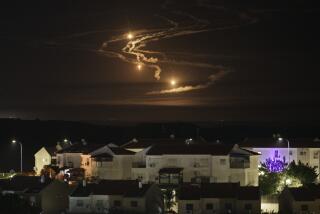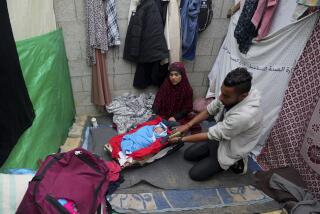Rescue Stalled for Thousands in Manila Hotels
- Share via
MANILA — Hundreds of American families and at least six ambassadors fled heavy fighting around the capital’s financial district early today, but a plan to evacuate thousands of people trapped in high-rise hotels stalled as government troops battled rebels in the streets.
Government officials sent buses marked with white flags to the Makati business and commercial district to rescue an estimated 2,000 foreigners and Filipinos pinned down in luxury hotels, embassies and condominiums since Saturday, but street fighting with machine guns, bazookas and mortars halted the operation.
U.S. officials set up an emergency center at the Philippine Plaza Hotel for people who fled Makati’s exclusive neighborhoods on the fourth day since an attempted military coup against President Corazon Aquino deteriorated into urban guerrilla warfare. More than 100 Americans were also housed at the embassy’s Seafront housing compound.
The ambassadors of Canada, Australia, New Zealand and at least three other countries also abandoned their homes as the fighting spread.
“We’re all five-star refugees,” said a former U.S. official who left Dasmarinas, a wealthy neighborhood filled with diplomats, top politicians and leading businessmen.
Government officials massed tanks and troops outside rebel strongholds in Makati, threatening to assault the high-rises in force. Rebel leaders said they would fight rather than surrender.
Defense Secretary Fidel V. Ramos has said repeatedly that the coup was “crushed,” but one daily newspaper, Philippine Newsday, curtly summed up the fighting with a headline, “ ‘Crushed Mutiny’ Continues.”
In a bizarre twist, the rescue plan was coordinated by the Philippine Department of Tourism. “Please let these innocent people go,” Tourism Undersecretary Rafael Alunan pleaded in a radio announcement.
The move was aimed at ending a tense three-day stalemate in which some 400 well-armed marines and Scout Rangers fought pitched street battles with government forces. The developments this morning capped a harrowing day and night in which rebel snipers fired on cars, Red Cross ambulances and a group of nuns from rooftop positions.
Early today, the U.S. Embassy urged Americans to “immediately leave their residences” and seek safety away from the fighting. The announcement was broadcast repeatedly on the U.S. military television network beginning at 7:30 a.m.
But the warning was quickly modified when the embassy realized evacuees could get caught in a cross-fire. “We’re saying, if you’re home, stay there and move to the safest room,” said embassy spokesman Jerry Huchel.
The warning was directed at Makati’s seven residential “villages,”--exclusive enclaves of well-tended gardens, swimming pools, high fences and private guards. They included Forbes Park and Dasmarinas, where top politicians, Cabinet secretaries, leading businessmen and diplomats live.
President Bush, upon hearing of the increased threat to Americans, telephoned Aquino on Monday night, Washington time.
White House Press Secretary Marlin Fitzwater quoted Bush as telling Aquino: “ ‘I understand some Americans are in the hotels. . . . Can we get those people out? I’m very concerned about their lives and their safety.’
“She assured him they were doing everything possible to protect American lives,” Fitzwater said.
Asked if Bush was considering sending in U.S. troops to rescue the Americans, Fitzwater said, “We don’t think that will be necessary.”
The rebels refused repeated appeals to surrender, including one by the wife of a rebel commander.
Several hundred other rebels continued to hold Mactan Air Base on Cebu, where an estimated 25 aircraft are stationed, including at least four F-5 fighters and two commercial Boeing 747s that were diverted to the southern island when fighting began last Friday.
Diplomats here said they could see no early end to the standoff, putting Aquino’s government in even greater difficulty.
“They seem to have expanded their territory,” a Western diplomat said of the mutineers. “I think they’re making it impossible for the government to get them out without making some kind of deal.”
Another said, “This isn’t going to be over anytime soon.”
Father Melchor David, who held a candlelight Mass on Buendia Avenue in Makati, said: “They are holding the whole Philippines as a hostage. We are all wary.”
Business leaders said the fighting will cripple the nation’s recent economic gains and Aquino’s attempts to attract foreign investment. The siege of Makati included the nation’s stock exchange, international banks and office complexes. Food and fuel shortages were reported in several places.
“It will do incalculable harm,” said Ricardo Romulo, president of the Makati Business Club Inc., an influential business and political forum. “We have to start all over again.”
At least three persons were reported killed Monday in Makati, bringing the uprising’s toll to at least 70. At least 500 reportedly have been wounded, including an American who was hit in the arm Monday as he stood in a window at the Peninsula Hotel.
Makati’s deserted streets echoed with bursts of machine gun and recoilless rifle fire amid Christmas decorations and a huge sign of lights that spelled out “PEACE.”
A doctor at the Makati Medical Center said late Monday that ambulances had stopped moving after several had come under fire. “They’re shooting anybody who moves,” he said.
On Ayala Avenue, three firetrucks used as barricades were riddled by gunfire and several windows were shattered at the British Embassy.
A dozen police officers hid behind trees and in culverts with machine guns and grenade launchers a block north of Ayala, not far from a rebel stronghold at the luxurious Inter-Continental Hotel.
Defense Secretary Ramos repeated assurances that the government had crushed the uprising. He insisted that loyalist troops were mopping up the remaining resistance. At least 600 rebels have been captured or have surrendered since the fighting began, he said.
But police along the barricades behind rebel-held apartment towers on Ayala Avenue seemed less sure of quick victory.
“Those soldiers will not surrender,” patrolman Rustico Villaflores said. “They will die fighting.”
The government used the national police and local police, rather than the army, for most of the fighting in Makati. Analysts said the government feared sending in soldiers against their mutinous colleagues.
A diplomat whose embassy has repeatedly come under fire said the rebels had caches of ammunition and were armed with bazookas, recoilless rifles, machine guns, grenade launchers and M-16 rifles. They controlled at least two armored cars equipped with .30-caliber machine guns, he said.
The rebels occupied 15 to 20 buildings, officials said, up from 11 the day before. At one point Monday, a witness said, they used a pickup truck to ferry supplies and ammunition from one building to another, even stopping to refuel.
A police sergeant behind the Makati fire station said the rebels had plenty of food because they occupied the Landmark Supermart, a well-stocked shopping center.
“They control all the supermarkets,” Sgt. Louis Villacrusis said. “They even have good wine.”
A U.S. Embassy spokesman estimated that 215 Americans were trapped in three luxury hotels, including the Inter-Continental. He said scores of other Americans live in apartment towers and condominiums that were under siege. Several hundred Japanese, Canadians, Germans and other foreigners were also pinned down, diplomats said.
On Monday afternoon, a grenade was fired into the parking lot of the Philippine Central Bank, several miles from Makati, damaging three cars. Several hours later, a bomb exploded nearby in a building under construction on the edge of Mabini, the crowded entertainment district. Windows were shattered in an empty van and a Chinese restaurant, and two persons were injured.
A foreign military official who asked not to be further identified gave the rebels high marks for planning and tactics.
“They’re very disciplined,” he said. “And they’re very well organized. They’ve taken the initiative the whole time, and the armed forces have responded.
“They secured the airfields first so they could reinforce themselves and the government couldn’t,” the official added. “And each time they move, they have a fallback. Each time they look like they’re deserting and giving up, they show up somewhere else in force, which means they had Plan A and Plan B.”
Military officials said they cleared the rebels over the weekend from the armed forces headquarters at Camp Aguinaldo, the air force headquarters at Villamor Air Base and the army headquarters at Ft. Bonifacio. But witnesses said heavy firing was heard Monday around Aguinaldo.
The rebels contend that Aquino, who took over after a civilian-backed military uprising ousted dictator Ferdinand E. Marcos in February, 1986, has failed to deliver on promises to put down a Communist insurgency, stop corruption and improve government services. This is the sixth military mutiny she has faced.
One of the rebel leaders, marine Col. Rafael Galvez, told reporters that the rebels will fight until Aquino resigns, or until they are killed.
“We will try our best,” he said. “If we cannot, then we will have to go down.”
On Monday afternoon, Galvez’s wife, Josephine, appealed to him in a radio broadcast to lay down his arms.
“Please, I am begging you,” she said. “If what I am doing is wrong, I am asking for your forgiveness. But I don’t know what to do anymore except this. If it is possible, please come home.”
There was no response.
THE REBEL COUP CONTINUES--About 400 well-armed rebel soldiers have taken over the luxury hotels and others high-rises in Manila’s Makati district, the nation’s business and commercial center. About 2,000 people, including hundreds of Americans, are trapped in the area.
Several hundred rebels hold the Mactan Air Base on Cebu, where an estmated 25 aircraft are stationed.
‘LAUREL AND HARDY’ WAR--The rebel standoff produced only fear and uncertainty. A24
More to Read
Sign up for Essential California
The most important California stories and recommendations in your inbox every morning.
You may occasionally receive promotional content from the Los Angeles Times.














